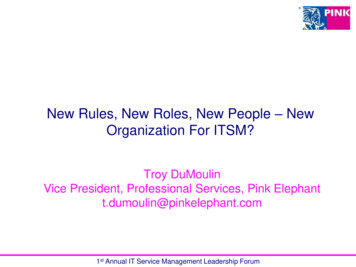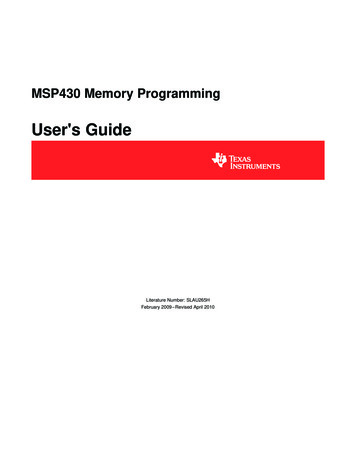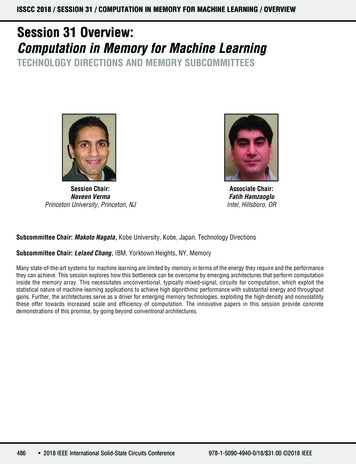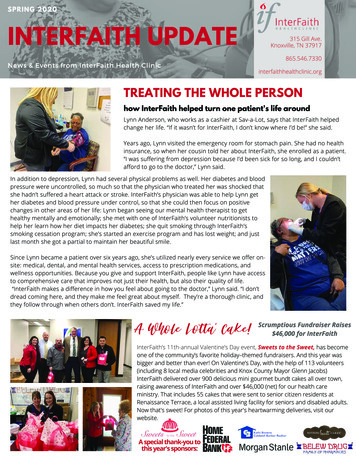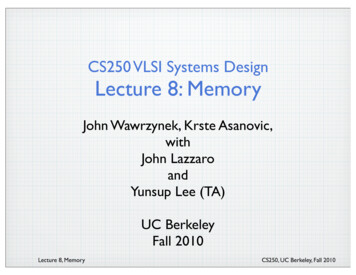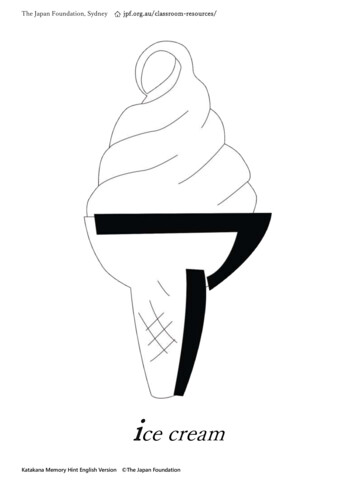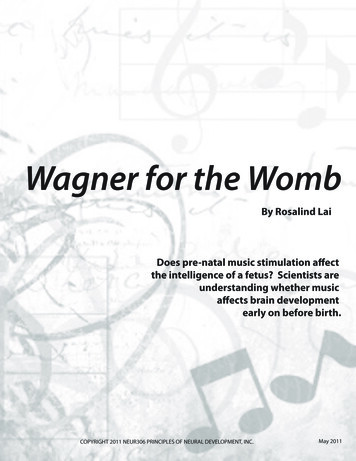
Transcription
MUSIC, INTELLIGENCE, AND BABIES - CAN WE LINK THESE TOGETHER?MUSIC SINCE THE BEGINNING OF TIMEAs humans, we all share one unique feature – theability to produce and enjoy music. Music is not a newconcept though. More than 165,000 years ago, our ancestorshave already invented percussion instruments. Today, allsocieties and cultures have music. With these ancient roots,music undoubtedly plays a significant part in our lives today.Over the past ten years, a record number of 297 millionApple IPods alone have been sold around the world. Thereare reasons for our fondness for music.Music affects our emotions and activates certainbrain areas, the same centers of the brain for food and drugaddictions. It seems that our appreciation for music is innate.Infants, even as young as two months old, turn to pleasantsounds, but away from dissonant, harsh, sounds. This fascination of music has made many scientists ponder – doesmusic affect more than our emotions? Does music physicallychange the brain and affects our intelligence?distinguish the mother’s voice from others. Since soundplays a role in the development of the fetus in the womb, acentral question has arised - does music affect fetal development?RESEARCH IN ANIMAL MODELSSince it is difficult, unethical and impractical toperform studies on human fetus, much research has beenconcentrated on the animal model. Whether animals havethe same appreciation for music is debatable, but a fewstudies have found an effect on pre-natal auditory stimulation.One study looked at whether pre-natal auditorystimulation affects spatial memory in rats. The researchersexposed pregnant mothers to noise or music for an hour aday until delivery and tested the pubs’ navigational ability ina maze test after birth. They found that the group stimulatedwith pre-natal music took much less time to find food in amaze compared with the group with no stimulus or theThis fascination of music has made many scientists ponder –Does music physically change the brainand affects our intelligence?THE MOZART EFFECTPerhaps one of the most well-known and arguablymost controversial phenomena is the Mozart Effect. Theterm was first coined by Dr. Afred Tomatis, who suggestedthat listening to compositions of Mozart increases a child’sIQ. This idea has been so favorable and popularized that theGovernor of Georgia, Zell Miller, even proposed a budget toprovide all children in Georgia with a CD of classical music.However, there has been great controversy among thescientific community as numerous studies have failed toreplicate this finding.Whether music improves intelligence in childrenremains to be elucidated. However, a new area of research isnot studying music in childhood, but music in the womb. Atlate gestational stage, the fetus can hear sounds fromoutside the mother, and from these sounds, can becomefamiliarize to her voice. After birth, the infant can. group stimulated with random noise. Interestingly, thegroup stimulated with random noise performed even worsethan the unstimulated group, suggesting it is music, and notrandom noise, which contributed to the improvement inspatial memory.Similar studies in different animal models have beenreplicated to correlate prenatal music stimulation withenhancement of spatial learning. In another study, music orno stimulation was provided to fertilized chick eggs. Following hatching, the chicks were trained to perform a similarmaze task to test for memory. The researchers found thatmusic-stimulated chicks took less time to reach the targetcompared with the un-stimulated group. These studies,taken together, suggest that pre-natal auditory stimulationdoes have an effect on learning, at least in the animal model.However, what is the underlying mechanism for theseenhancements, and are these changes due to the brainbeing structurally altered?COPYRIGHT 2011 NEUR306 PRINCIPLES OF NEURAL DEVELOPMENT, INC.May 2011
NEW NEURONS IN MEMORY CENTER OF THE BRAINNumerous studies have found that pre-natal exposure to music in the animal model increases neurogenesis,the birth of neurons, in the memory-center of the brain, thehippocampus. The hippocampus is a major brain structurepresent in all mammals involved in the consolidation ofshort-term to long-term memory, and in spatial navigation.Damages to this area of the brain result in memory loss.Alzheimer’s disease is an example where the loss of memoryis largely attributed to damages at the hippocampus.On the contrary, studies have found that increasedneurogenesis at the hippocampus enhances memory. Ratsstimulated by music before birth display an increase in thebirth of neurons at the hippocampus, and an improvementin spatial memory. At the molecular level, music upregulatesthe expression of proteins involved in the survival ofneurons, such as CREB, p-CREB, and BDNF. Music may stimulate an improvement in memory through the increase inneurons at this brain area.The number of synapses of the neurons alsoincreases at the hippocampus. The synapse is a junction thatallows neurons to pass chemical signals to another cell forcommunication. Thus, a neuron with more synapses wouldbe communicating with more neurons. A higher synapticdensity has been correlated with improvement in memory.Having neurons that are talking to other neurons more seemto improve spatial memory. Perhaps pre-natal music stimulation changes the expressions of proteins at the molecularlevel, which allows more neurons to be born and to communicate with one another, leading to an enhancement inspatial memory.The effect of music reducing stress and anxiety isalso present in pregnant mothers. In a study conducted atthe College of Nursing at Kaohsiung Medical University,Taiwan, the researchers recruited 236 pregnant women intheir second or third trimester, all with similar backgroundsin occupation, class, education level, and marital happiness.Half were given CDs and listened to music for half an houreach day. They were given the choice of listening to classicalmusic, nature sounds, Chinese children’s rhymes and songs,Although both groups received the same routine prenatal care,mothers who listened to music had a lower level of stress,anxiety, and depression scores even only after two weeks.DIRECT OR INDIRECT EFFECTS OF MUSIC?The mechanism proposed above is that auditorystimulation directly increases neurogenesis at the hippocampus by changing protein levels, leading to an enhancement in memory. However, many debates have been onwhether these changes in brain structure are due to indirecteffects of music. Perhaps music leads to a secondary effectthat causes these differences.One such effect is the lowering of stress. Music isknown to be a reliever for stress and anxiety. Music therapy iswidely used and is effective in alleviating these symptoms.or lullabies.The other half did not listen to the CD. Althoughboth groups received the same routine prenatal care, mothers who listened to music had a lower level of stress, anxiety,and depression scores even only after two weeks. As thestudy’s author, Dr. Chung-Hey Chen, explained in a newsrelease, “Our study shows that listening to suitable musicprovides a simple, cost-effective and non-invasive way ofreducing stress, anxiety and depression during pregnancy.”COPYRIGHT 2011 NEUR306 PRINCIPLES OF NEURAL DEVELOPMENT, INC.May 2011
Stress is beneficial during evolutionary development. In the body, stress upregulates a hormone, cortisol,which leads to the body’s “fight or flight” response. Cortisolheightens energy metabolism, and suppresses nonimmediately needed processes, like immunity and reproduction. However, long-term exposure to cortisol leads to negative effects, such as impaired cognitive performance,lowered immunity and infertility. A high level of cortisol iscorrelated with increased cell death at the hippocampus.Both androgens and estrogens are involved in theorganization of neurons in the brain. Estrogens regulateimportant molecules that promote the growth of neurons,such as brain-derived neurotrophic factor (BDNF) and nervegrowth factor (NGF) Androgens also increase NGF. In fact,music increases neurogenesis, the regeneration and repairof neurons in the adult brain by altering androgen and estrogen levels. Therefore, music may also enhance spatialmemory by indirectly altering levels of these hormones inIn fact, music increases neurogenesis, the regenerationand repair of neurons in the adult brain by altering androgenand estrogen levels.Pre-natal stress is also linked to learning deficits.Offspring from pregnant rodent mothers exposed to stressperform poorer in spatial memory tasks. Pre-natal stressaffects the offspring in adolescents and even well into adulthood. Not only is spatial memory altered, but the brainmorphology is also changed. The animals display a reducedcell growth and accelerated aging in the hippocampus.Furthermore, researchers found more cells dying and undergoing degeneration at this brain region. In these animals, theadrenal gland, the source for cortisol, also increased in size,suggesting that the effects in the brain may be because of anincrease in stress hormone in the body. Pre-natal stressaffects neurogenesis at the hippocampus through anincrease in cortisol, which leads to poorer performance inspatial memory. This is the opposite effect of music, whichincreases neurogenesis and enhances spatial memory, amedium that also reduces stress and anxiety.Perhaps music indirectly affects the growing fetus bylowering stress and cortisol in the mother, rescuing thesenew-born neurons and leading to enhancements in spatialmemory.the body, which leads to changes in protein levels at thehippocampus.Our brains are affected by many chemicals. Cortisoland steroid hormones are only a few that have an effect onneurons. There may be many more chemicals involved toexplain music’s effect on the enhancement in spatialmemory.MUSIC ALTERS STEROID HORMONESCortisol may not be the only hormone that musicaffects. Steroid hormones, androgens and estrogens, aresuggested to be involved. While androgens are usuallyreferred to as male hormones and estrogens as femalehormones, we all possess both types. After listening tomusic, men have a lower level of androgens, but womenhave a higher level of these hormones. Estrogen level is alsoaltered by musical stimulation. It has been suggested thatmusic changes our mood, leading to alterations in the levelsof steroid hormones in our body.COPYRIGHT 2011 NEUR306 PRINCIPLES OF NEURAL DEVELOPMENT, INC.May 2011
SIGNIFICANCE IN HUMANMusic improves spatial memory in rodents and otheranimal models. However, one criticism is that humans experience and appreciate music different than animals. Canthese non-human studies be applied to us?While there are no studies that look at stimulatingpregnant human mothers with music and performing testson infants, studies do suggest a correlation between musicians and spatial memory. Furthermore, musical training hasbeen found to enhance spatial recognition tasks inpre-school children and improve their learning of mathematics and science. While these effects may be attributed totraining and not listening itself, music does seem to have abeneficial effect.TO LISTEN OR NOT TO LISTENTo a pregnant mother, the most important question may be, “Should I listen to music then?”. While wedo not know whether music directly or indirectly affectthe brain in animal studies, music does alleviate prenatal stress, which is at least beneficial for the mother.As of now, there are no studies that demonstrate acorrelation between music and negative effects. Musicalso minimizes the distress of labor. While controversiesremain on the effects of prenatal musical stimulationon intelligence, there are no doubts that music benefitsthe mother. A mother should not listen to music.expecting to increase a child’s intelligence, but listenfor her own enjoyment and benefits. Who knows,maybe listening to Wagner helps you relax and givebirth to the next Einstein. As Shakespeare wrote, “Ifmusic be the food of love, play on”!More to ExploreChang, M.Y., Chen, C.H., and Huang, K.F., 2008, Effcts of music therapy on psychological health of women during pregnancy: J Clin Nurs, v.17, p2580-7.Chaudhury, S., and Wadhwa, S., 2009, Prenatal auditory stimulation alters the levelsof CREB mRNA, p-CREB and BDNF expression in chick hippocampus: Int J DevNeurosci, V.27, p.583-90.Fukui, H., and Toyoshima, K., 2008, Music facilitate the neurogenesis, regenerationand repair of neurons: Med Hypotheses, v.71, p.765-9.Kauser, H., Roy, S., Pal, A., Sreenivas, V., Mathur, R., Wadhwa, S., and Jain, S., 2011,Prenatal complex rhythmic music sound stimulation facilitates postnatal spatiallearning but transiently impairs memory in the domestic chick: Dev Neurosci, v.33,p.48-56.Kim, H., Lee, M.H., Chang, H.K., Lee, T.H., Lee, H.H., Shin, M.C., Shin, M.S., Won, R., Shin,H.S., and Kim, C.J., 2006, Influence of prenatal noise and music on the spatialmemory and neurogenesis in the hippocampus of developing rats: Brain Dev, v.28,p.109-14.Lemaire, V., Koehl, M., Le Moal, M., and Abrous, D.N., 2000, Prenatal stress produceslearning deficits associated with an inhibition of neurogenesis in the hippocampus:Proc NatI Acad Sci USA, v.97, p.11032-7.Rauscher, F.H., Shaw, G.L., Levine, L.J., Wright, E.L., Dennis, W.R., and Newcomb, R.L.,1997, Music training causes long-term enhancement of preschool children’sspatial-temporal reasoning: Neurol Res, v.19, p.2-8.Tabarro, C.S., de Campos, L.B., Galli, N.O., Novo, N.F., and Pereira, V.M., 2010, Effectsof the music in labor and newborn. Rev Esc Enferm USP, v.44, p.445-52While controversies remain on the effect of prenatal musical.stimulationon intelligence, there are no doubts that musicbenefits the mother.A mother should not listen to musicexpecting to increase a child’sintelligence, but listen for her ownenjoyment and benefits.COPYRIGHT 2011 NEUR306 PRINCIPLES OF NEURAL DEVELOPMENT, INC.May 2011
the birth of neurons, in the memory-center of the brain, the hippocampus. The hippocampus is a major brain structure present in all mammals involved in the consolidation of short-term to long-term memory, and in spatial navigation. Damages to this
